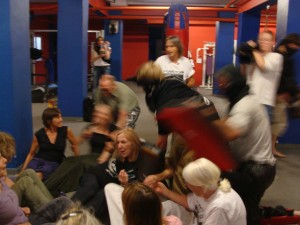 Maan News Agency, June 25, 2011
Maan News Agency, June 25, 2011
Non-violence training and anti-sabotage measures are in place for the volunteers, activists and media arriving in Athens as the Freedom Flotilla II prepares to sail to Gaza.
In hopes of preventing sabotage which organizers said docked two boats from the 2010 flotilla, the ships for the June voyage have been moored in undisclosed locations, and press members have been asked not to release photographs of the vessels.
Upon arrival, those registered to sail to Gaza and attempt to break the Israeli blockade will participate in seminars designed by flotilla organizers on how to handle expected confrontations with Israeli forces when the boats approach the Gaza shore.
The six ships that sailed in May 2010 were intercepted in international waters by the Israeli navy in a deadly raid that left nine activists dead.
Lynda Brayer, a human rights lawyer, maintains that the military operation against the 2010 flotilla was a violation of international law.
Speaking with Ma’an, Brayer explained that the men and women on the ships were unarmed civilians. “They are what [are] called in international law hors de combat, which means out of the field of combat. That is the definition of civilians. Because they’re not part of the other side, they don’t fall into the category of an army, so they’re not allowed to be attacked.”
A fact-finding mission convened by the United Nations Human Rights Council, after the 2010 flotilla, found after investigation that:
“The conduct of the Israeli military and other personnel towards the flotilla passengers was not only disproportionate to the occasion but demonstrated levels of totally unnecessary and incredible violence. It betrayed an unacceptable level of brutality. Such conduct cannot be justified or condoned on security or any other grounds. It constituted grave violations of human rights law and international humanitarian law.”
The report called the Israeli blockade “totally intolerable and unacceptable.”
Despite the report, Israel’s military and naval forces are making pre-emptive efforts to justify intervention and possibly an attack on the ships and passengers of the latest siege-breaking attempt. Statements by Israeli officials have depicted those participating in the effort as combatants, or as in some way against the state of Israel.
Israel Navy commander Admiral Eliezer Marom recently claimed that the flotilla brings weapons to Hamas, calling the initiative “driven by hate.”
After inspection in Ashdod where the intercepted ships from 2010 were towed, no weapons shipments were identified.
Brayer further debunked the assertion, saying “every ship that leaves port is inspected. It wouldn’t be allowed to leave any port if it was [carrying arms].”
When asked if Israel had any right to intercept the June flotilla in international or neighboring waters, Brayer answered, “No, absolutely not.”
“Israel is entitled to protect its own coastline, which ends at the northern border of Gaza. At that sea coast, they may stop ships from entering its waters.”
Brayer, a South African who immigrated to Israel 46 years ago, also had strong words against the blockade.
“A siege is an act of warfare,” she remarked. “This is an act of warfare against an entire civilian population, people who have no means to protect themselves.
“The flotilla should be seen in the light of the Jewish accusation that no one helped them during the time of Hitler,” she added. “People in the outside world are making the moral decision and are saying, ‘I refuse to be in cahoots with [the blockade] and I refuse to remain silent’.”
An ever tightening siege, Brayer worried, was a step toward genocide, explaining that genocide is not something that begins suddenly. “It was a process during the Holocaust,” she says, referring to the first restrictions that were placed on European Jews during World War II.
“We have to ask ourselves: [Is Israel] in such a process?” Brayer continued. “I think we are.”
The Freedom Flotilla II has 10 ships which will carry humanitarian aid, including letters addressed to the residents of Gaza, and will attempt once again to break the siege, a blockade that has been widely decried as both illegal and inhumane.
The UN has condemned the siege on several occasions. In 2010, the UN High Commissioner for Human Rights, Navi Pillay, stated that the blockade was illegal because it violates the Fourth Geneva Convention’s prohibition against the collective punishment of civilians and demanded that it come to an end.
Israel claims that the blockade is a response to the 2007 Hamas takeover of Gaza. But some observers dispute this by pointing out that the hermetic closure of the Strip is the culmination of a process that actually began in 1991, with restrictions on Palestinian movement.
*Photo: Mya Guarnieri. American activists who will challenge the Israeli blockade of the Gaza Strip undergo a simulation of an IDF raid.